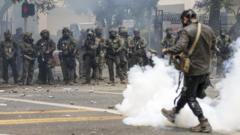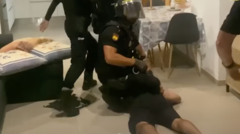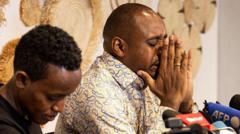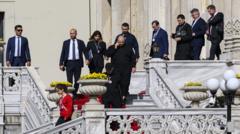In a significant crackdown on May Day demonstrations, Turkish police arrested hundreds of protesters in Istanbul as they sealed off Taksim Square and deployed tens of thousands of officers in an effort to prevent unrest. Despite the police presence and heavy restrictions, calls for labor rights and political freedom echoed through the city, underscoring deepening frustrations among citizens.
Major Crackdown on May Day Protests in Istanbul Leads to Widespread Arrests

Major Crackdown on May Day Protests in Istanbul Leads to Widespread Arrests
Authorities in Istanbul have imposed strict restrictions on May Day protests, resulting in hundreds of arrests and heightened tensions in the Turkish capital.
As May Day celebrations unfolded worldwide, Istanbul witnessed a heavy-handed response from Turkish authorities, with 50,000 police officers mobilized to stifle protests. The iconic Taksim Square, long a focal point for labor demonstrations, remained locked down and largely deserted, facing restrictions that banned public gatherings.
Visual reports captured scenes of skirmishes as riot police clashed with demonstrators, with chants echoing through the streets as authorities forcibly detained individuals, pushing them onto waiting buses. The crackdown comes in the wake of rising tensions following the controversial arrest of Ekrem Imamoglu, the popular opposition mayor of Istanbul, which had previously sparked significant protests across the city.
In a striking measure, public transportation was shut down, effectively limiting access to Taksim Square, which has hosted vibrant May Day marches in the past. As police presence intensified, the square transformed from a lively hub into a ghostly tableau, with shops shuttered and only a few labor unions allowed to briefly exhibit banners and flowers in a restrained display of solidarity.
Amid the tense atmosphere, concerns about civil liberties were voiced by rights organizations. Amnesty International condemned Turkey's crackdown, deeming the restrictions as unfounded and an infringement on the rights to assemble and protest peacefully. The organization called for an urgent reassessment of the nation's heavy-handed policies on demonstrations.
Protesters, including students and workers, expressed frustration about their silenced voices, with many reporting feelings of oppression akin to a state of emergency. As authorities ramped up efforts to maintain order, those grappling with the limitations of free speech and assembly grew increasingly disillusioned, raising questions about the state of democracy in Turkey.
The ongoing political landscape is complicated by the presence of Imamoglu, who, while in custody, remains the primary threat to President Erdogan's long-term hold on power. As Erdogan prepares for the upcoming elections, the implications of these protests and the response from the government may signal a pivotal moment for Turkey's political future.




















